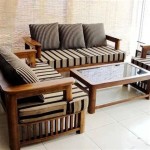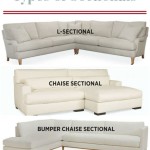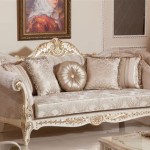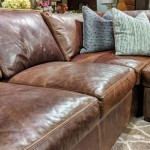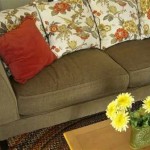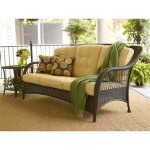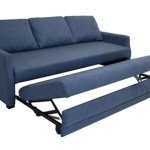Your Guide to Sofa Parts: A Comprehensive Overview
Understanding the various components of a sofa can be beneficial when purchasing, repairing, or simply appreciating the craftsmanship of this essential piece of furniture. This guide provides a detailed breakdown of standard sofa parts, empowering consumers with the knowledge to make informed decisions.
Frame Construction
The frame constitutes the foundation of the sofa and significantly impacts its durability and longevity. Common frame materials include hardwood, softwood, plywood, particleboard, and metal. High-quality frames typically utilize kiln-dried hardwood, such as oak or maple, joined with dowels, corner blocks, and glue for superior strength and stability.
Support System: Springs and Webbing
The support system, comprised of springs and webbing, works in conjunction with the frame to provide comfort and resilience. Sinuous springs, also known as "S" springs, are commonly used and offer affordable support. Eight-way hand-tied springs provide superior comfort and durability but are typically found in higher-end sofas. Webbing, often made of jute or elastic, stretches across the frame to provide a base for the cushions and further enhance support.
Cushioning: Foam, Down, and Fiberfill
Cushions significantly influence a sofa's comfort and aesthetic appeal. Various cushion fillings cater to different preferences and budgets. High-density foam provides firm support and maintains its shape well. Down feathers offer a luxurious, plush feel but require regular fluffing. Fiberfill, a synthetic material, provides a budget-friendly alternative to down, offering a softer feel than foam.
Upholstery: Fabric and Leather
Upholstery refers to the material covering the sofa's frame and cushions. A vast array of fabric options exists, including cotton, linen, polyester, velvet, and microfiber, each offering distinct aesthetic and performance characteristics. Leather upholstery provides a classic, durable option, with variations in grain and finish impacting its look and feel.
Arms: Styles and Functionality
Sofa arms contribute significantly to the overall style and comfort of the piece. Common arm styles include rolled, track, English, flared, and pillow-top arms. Each style offers a unique aesthetic and can influence the seating space and overall dimensions of the sofa.
Legs: Material and Design
Sofa legs play a crucial role in both support and style. Common leg materials include wood, metal, and plastic. Leg designs vary widely, ranging from simple tapered legs to ornate carved designs. The height and style of the legs can dramatically impact the sofa's overall appearance and can complement various interior design styles.
Back: Construction and Design
The back of the sofa significantly contributes to both comfort and aesthetics. Different back styles exist, including tight back, loose back, and pillow back. Tight back sofas offer a clean, tailored look, while loose back sofas offer a more relaxed and casual feel. Pillow back sofas provide additional comfort and support with detachable cushions.
Skirt: Fabric and Style
The skirt is a decorative fabric panel that runs along the bottom edge of the sofa, concealing the legs and frame. Skirts can be made from various fabrics and come in different styles, such as pleated, gathered, or tailored. The presence or absence of a skirt significantly influences the sofa's overall appearance.
Other Components: Buttons, Tufting, and Welt Cord
Several additional components can enhance the aesthetic appeal and functionality of a sofa. Buttons can be functional, securing tufting, or purely decorative. Tufting creates a textured, patterned surface by pulling sections of the upholstery inwards and securing them with buttons or stitching. Welt cord, a fabric-covered cord, adds a tailored finish and can be used to define the edges of cushions and arms.
Understanding Sofa Dimensions
Understanding sofa dimensions is crucial for ensuring it fits comfortably within a given space. Key measurements include overall length, depth, height, seat height, and arm height. Considering these measurements before purchasing a sofa can prevent costly mistakes and ensure a comfortable fit.
Care and Maintenance of Sofa Parts
Proper care and maintenance can significantly extend the lifespan of a sofa. Regular cleaning, vacuuming, and rotating cushions can help prevent premature wear and tear. Addressing spills and stains promptly can prevent permanent damage to the upholstery. Understanding the specific care instructions for the chosen upholstery material is essential for maintaining its appearance and durability.

Image Result For Parts Of A Sofa Interior Design Instagram Images Furnishings

What Are The Parts Of A Leather Sofa Currier S Real Furniture

What S In Your Sofa Bound Collaborative

Anatomy Of A Sofa Google How To Make Bed Design Pet Cover

Www Sofa Com Cushions On Corner Fabric Frame

How Sofa Is Made Material Making History To Make Used Parts

Order Replacement Parts Recliner Franklin Corporation

Sectional Sofa Components Guide

Ilrated Diagrams Of The Parts A Couch 2024 Guide Home Stratosphere
Types Of Living Room Furniture

